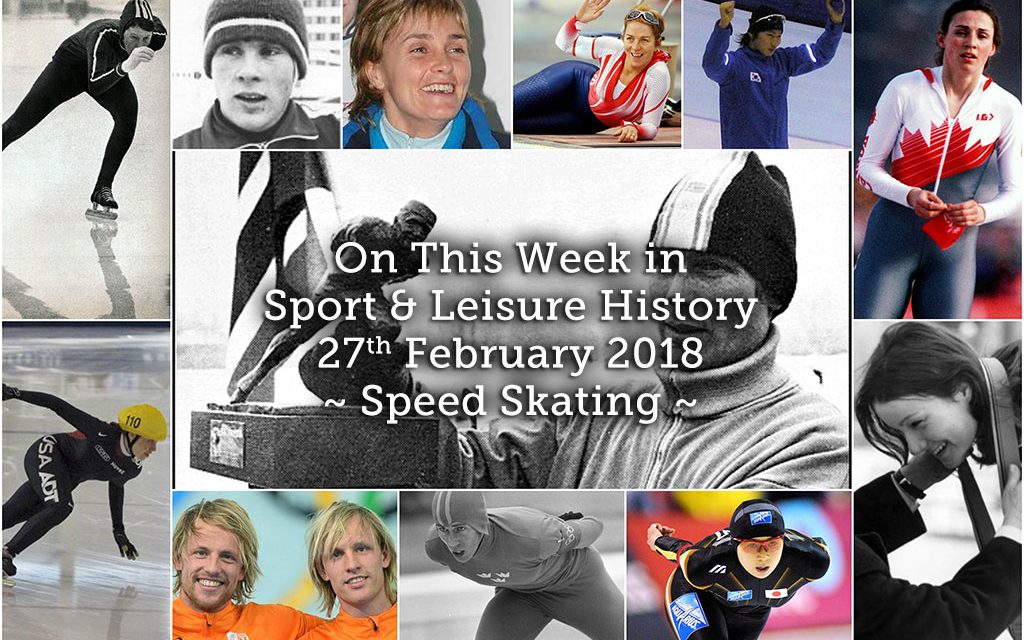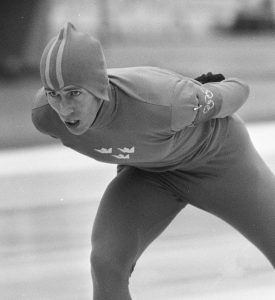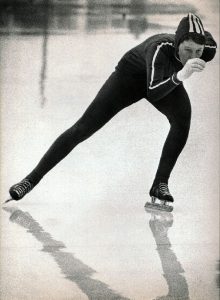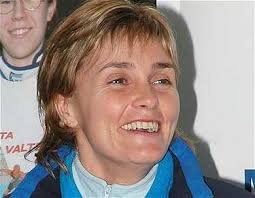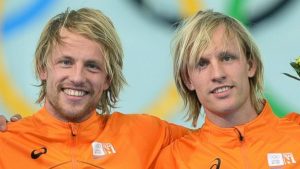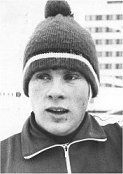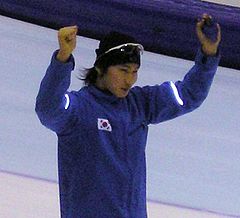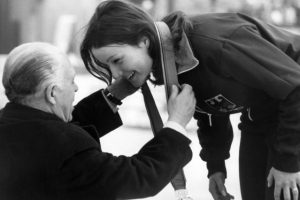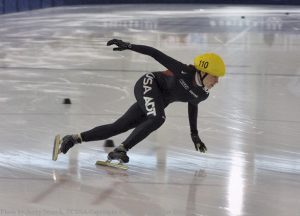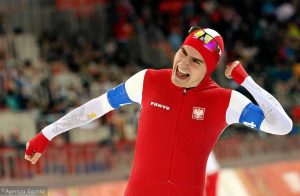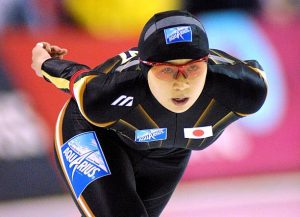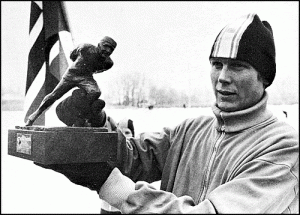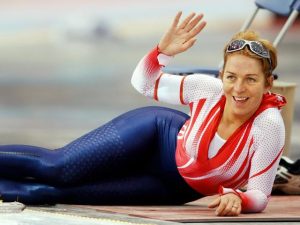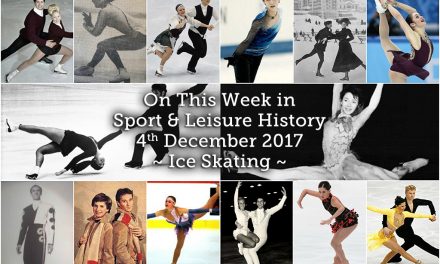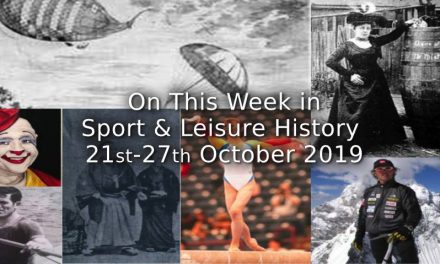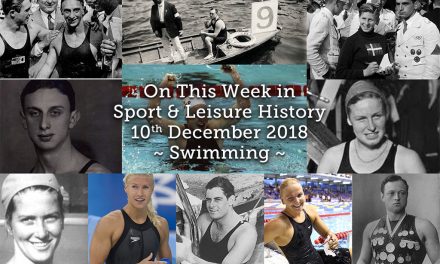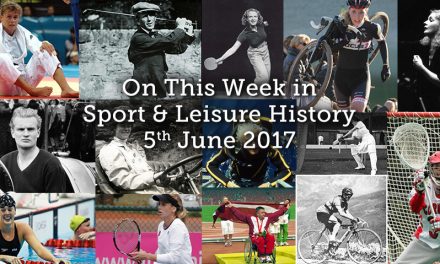26th– Hans Johnny Höglin was born on this day in 1943 in Nykroppa, Sweden. He was a very surprising Olympic 10,000 m champion at Grenoble in 1968 when he beat the favourite, Fred Anton Maier, by 3/10th of a second with a fast final lap. Placing fifth in both the 1500m and 5000m earlier in the Olympics, Höglin had already performed better than expected. In 1968 and 1969 he finished sixth at the World Championships and at the 1972 Games he was 9th in the 1500m and 12th in the longer event – but his Olympic gold was his only international podium position in his entire amateur speed skating career. In Swedish Championships, he won the all-around title in 1968, while earning distance titles in the 1500m (1968, 1972) and 5000m (1968). He turned professional in 1973/74 season but without much success. His professional activities caused him to be blacklisted by the Swedish federation, but he was later allowed to become a youth coach. Tragically his younger brother Urban, along with Urban’s fiancée Heidi Paakkonen, were murdered while touring New Zealand in 1989.
Connie Carpenter-Phinney, born today in 1957 in Madison, Wisconsin, USA – holds the distinction as the first women cyclist to win an Olympic gold medal, which she did in winning the 1984 road race, the first Olympic cycling event for women. But as Connie Carpenter, this was 12 years after her first Olympic appearance, which came in speed skating at the 1972 Winter Olympics in Sapporo, when she was only 14-years-old. Carpenter was US national overall champion in speed skating in 1976, but injuries prevented her from competing at the 1976 Winter Olympics. She then turned primarily to cycling and won multiple titles, highlighted by a 1983 World Championship gold medal in the individual pursuit, after she had finished second in that event in 1982. On the road, Carpenter won silver in the 1977 World Championships and a bronze in the 1981 Worlds. Carpenter-Phinney won 12 US cycling championships, more than any man or woman in history. Her other major cycling victories included the 1977 Tour of Fitchburg and two victories at the Coors Classic (1977, 1982). In addition, she rowed for the University of California in the national collegiate championships, winning an NCAA Championship in the 1980 coxless fours. Carpenter married Davis Phinney, an American professional cyclist known for his sprinting, which enabled him to probably win more races than any American cyclist ever in the professional peleton. One of their children, Taylor Phinney, became a top track cyclist, winning the individual pursuit world championship in 2009/10, and later turned to the road, racing several times in the Tour de France, in addition to his Olympic appearance
Born on this day in 1968 – Song Hwa-Son. This North Korean speed skater competed in two Winter Games. In Calgary in 1988, her best placing was 9th in the 1500m, four years later in Albertville she competed in the 500m, 1000m and 1500m but failed to make the top 20 in any of the events.
Sweden’s Per Martin Joakim Johansson was born in 1973 in Malma and was affiliated to SK Skrinnaren. Competing in three Olympics – 1994, 1998 and 2002, his best result came in the shorter 500m event Lillehammer where he came 7th.
- Hans Johnny Höglin
- Connie Carpenter-Phinney
27th James Thomas “Jim” Chapin was born on this day in 1955 in St Louis, USA and was affiliated to the Gateway Speedskating club in his youth and then the Metros Speedskating Club in St. Louis. He was a sprinter, who in 1972 won the 500m at the World Junior Championships, placing 19th in all-around. Chapin competed in the World Sprint Championships in 1978, finishing 11th. He participated in the 500m event at the Winter Olympics of 1976 and 1980, finishing in 10th and 24th place respectively
Japan’s Toshiyuki Kuroiwa, born today in 1969 in Tsumagoi, skated for Misawa Homes Co and though hailing from the same town as the two-time World Sprint Champion, she is not related to his namesake Akira Kuroiwa. He had his breakthrough season in 1991, winning a bronze in the World Sprints, three World Cup races and two titles at the Winter Universiade. A consistent top performer in 1992, he won a silver medal in the Olympic 500m, while repeating his third place in the World Sprint Championships. In addition, Kuroiwa finished second in both the 500 and 1000m World Cups that season. After these top years, Kuroiwa fell out of the top sprint ranks, and was surpassed by other Japanese sprinters. An ankle injury marred his appearance in the 1994 Olympics. His career had a slight revival in 1997/1998, as the first Japanese to try out the clap skates, and qualifying for the Olympics in Nagano. Following his retirement in 2002, he became a speed skating coach. As an aside -Clap skates are a type of ice skate that unlike traditional skates where the blade is rigidly fixed to the boot, clap skates have the blade attached to the boot by a hinge at the front. This allows the blade to remain in contact with the ice longer, as the ankle can now be extended toward the end of the stroke, as well as for more natural movement, thereby distributing the energy of the leg more effectively and efficiently. They were developed at the Faculty of Human Movement Sciences of the Vrije Universiteit of Amsterdam, led by Gerrit Jan van Ingen Schenau, although the idea of the clap skate is much older; designs dating from around 1900 are known. The clap skate was used first in the 1984/1985 skating season. It was, however, not until the late 1990s that the idea was taken seriously. In the 1996/1997 season, the Dutch women’s team started using the skates with great success. The rest of the skating world soon followed suit, causing a torrent of world records to be broken in the following seasons, including the 1998 Winter Olympics in Nagano. In the 1996–1997 season, the use of the clap skate caught on the highest level, and in 1997 Tonny de Jong was the first European all round champion using the clap skate, leaving Gunda Niemann, the defending world champion, in second place. Niemann remarked that the skate was illegal, and should be outlawed. In the following years the clap skate started to dominate the long track speedskating landscape. The design was banned from use in short track speed skating. Research completed in 2001 showed that the speed gain from using the clap skate does not originate in using the calf muscle to stretch the ankle, as was assumed in the creation of the clap skate, but in the fact that the point of rotation is moved from the tip of the skate to the hinge, facilitating the transfer of power to the ice.
Born on this day in Bormio, Italy in 1974, Marinella Canclini, her home club was G.S. Forestale in Roma. Along with her team mates Mara Urbani, Katia Colturi and Barbara Baldissera she was the 3000m relay world champion in 1996. She has represented her nation in four consecutive Olympics, in Albertville 1992, Lillehammer 1994, Nagano 1998 and Salt Lake City 2002. Her best performance came at Lillehammer where her and the 3000m team were placed 4th in the final.
Twins Michel and Ronald Mulder were born on this day in Zwolle, Netherlands in 1986. Both successful Olympians – with Michel winning a gold and a bronze in 2014 in the 500m and 1000m respectively. Despite being the Olympic champion he failed to qualify for the 2018 Olympics. His twin Ronald competed in 2010 and 2014, winning 500m bronze in 2014, behind his brother. In the recent PyeongChang Games he was 7th in the short 500m event. He is the current holder of the Dutch 500m short track record.
- Marinella Canclini
- Mulder Twins
28th-Willy Olsen was born on this day in 1950 and is a former Norwegian speed skater from Tynset who competed internationally in the 1970s. His strength was in the longer distances, and he won the 5000m at the national championship in 1972. At the 1972 Winter Olympic in Sapporo he finished 5th in the 5000m He was affiliated to Tynset IF and joined the first professional league,International Speed Skating League, in 1973. After the dissolvement of the league in 1974, Olsen became a speed skating coach.
Russian Kauko Johannes Salomaa was born in Vyborg in1928, died on 29th July 2016 at the age of 88 in Finland. Skating for Helsingin Luistinkiit in Helsinki, he represented his country in two Olympics – Oslo 1952 and Cortina 1956, he took part in four events in Oslo- 500m, 1500m, 5000m and 10k, his best placing being 7th in the 1500m. Four years later he competed in the two longer events coming 21st and 17th.
Cheon Ju-Hyeon also known as Chun Joo-Hyun was born in South Korea in 1977. He participated in the 1998 Olympics in Nagano, placing 21st in the 1000m and 15th in the 1500m
Another Sorth Korean, Lee Gang-Seok (Lee Kang-Seok) was born on this day but in 1985. Primarily a 500m specialist, Lee Gang-Seok had his breakthrough season in 2005/2006. After taking his first World Cup race in December 2005, he went on to win the season’s World Cup. Lee also grabbed a bronze medal in the Olympic 500m, the first Korean speed skating medal since 1992. The following year, he celebrated more successes, becoming World Champion in his favourite distance as well as winning it at the Asian Games. In addition, he lowered the 500m World Record to 34.25. After winning the 2008 100 m World Cup and winning a second 500m world title in 2009. At the 2010 Olympics he was placed 4th in the 500m and four years later in Sochi he was 22nd in the same event
- Willy Olsen
- Lee Kang-Seok
1st March -Herbert Höfl, West German speed skater was born on this day in Munich in 1941. Affiliated to DEC Frillensee in Inzell, he participated with the mixed German team at the 1964 Innsbruck Winter Games. He placed 24th in the 500m and 26th in the 1500m. At the 1968 Grenoble Olympics he finished 11th in the 500m, then representing West Germany. In 1967, he earned a bronze medal at the Europeans in the 500m. In 1963 he was West German champion in the all-around competition. Originally trained as a sports teacher, Höfl later became a successful speed skating coach in West Germany. He was first West Germany’s assistant coach under Norwegian head coach Thormod Moum, and then became national head coach in 1971. In 1976,he retired and became a self-employed sports and marketing manager. In 1993 he was elected president of the Golf Club Herzogenaurach. His son Marcus Höfl married Maria Höfl-Riesch who was one of the most successful German alpine skiers in the 2000s and 2010s, winner of 3 Olympic golds and a silver. Maria’s sister Susanne Riesch competed in the 2010 Olympic Games in the Giant Slalom but failed t finish. Their uncle Wolfgang Zimmerer was a West Germany Olympic bobsledder, who won 4 Olympic medals between 1968 and 1976 (1 gold, 1 silver and 2 bronze)
Another West Germany speed skater, Monika Gawenus-Holzner-Pflug was born in 1954, and was also part of the DEC Frillensee club in Inzell. At the age of 17, Monika Plug took the speed skating world by storm. In the 1972 season, she won the World Sprint Championships, earned an Olympic gold in the 1000m in Sapporo, and broke the world record in the sprint combination. While it would remain her best year, Monika Pflug would stay a well-known face in skating for the next 15 years, disappearing only briefly to become a mother. In that period, she mounted the World Sprint podium three more times, third in 1973, 1974 and 1982. She also tried her hand at all-round skating, coming 4th in the 1973 European Championships. Her collection of West German titles is impressive, winning the all-round crown 8 times (1971-76, 1981-82) and the sprint title 8 times (1975, 1979, 1981-84, 1986-87). Married to Franz Holzner in 1974, she competed as Monika Holzner-Pflug for much of her career. Following a divorce and remarriage to fellow speed skater Fritz Gawenus, she competed under that name in the last years of her career.
Canadian Susan Margaret Auch was born today in 1966. She began racing at the age of 9 at a long track speed skating oval in Winnipeg that would later be named in her honour, but first found success on the ice in short track speed skating. She took home her first medal at the 1985 World Championships, bronze in the 500m, and won medals of all colours later that year at the Universiade. Two gold medals at the 3000m relay followed at World Championship events in 1986 and 1988 before Auch claimed bronze in the event at the 1988 Winter Olympics, when short track was still a demonstration sport. After 4 years on the Canadian national short track team, Auch moved on to long track, where she would spend almost a decade and a half on the national team. After a non-medalling appearance at the 1992 Winter Olympics, she claimed silver medals in the 500m, her specialty, at the 1994 and 1998 Games. In the same year as her first Olympic medal, she finished third overall in the event at the World Cup and took silver at the World Championships, earning her the title of Manitoba Female Athlete of the Year. Between her two Olympic medals, despite suffering a stress fracture in her femur, she finished second in her event at the World Cup in 1995, claimed silver and bronze at the World Championships and won the Bobbie Rosenfeld Trophy as Canadian Press Female Athlete of the Year. After retirement in 1999, a comeback in 2000 and a non-medalling appearance at the 2002 Winter Olympics, Auch retired for good. She now works primarily as a real estate agent in Calgary, although she also makes appearances as a motivational speaker and sits as a member on Speed Skating Canada’s board. She was inducted into the Manitoba Sports Hall of Fame in 2003.
Born on this day in 1983 in South Korea, Song Seog-U, he was part of the South Korean 5000m relay team that became Olympic Champions at that event in the 2006 Games in Torino.
- Monika Gawenus-Holzner-Pflug
- Susan Auch
2nd– Julie Goskowicz Koons, American short track speed skater and a two-time Winter Olympian was born on this day in 1980. Affiliated to the Midway SC in Saint Paul, she competed as part of the United States speed skating team in the 3000m relay in both the1998 Winter Olympics in Nagano and the 2002 Winter Olympics in Salt Lake City. Julie’s brother is also a former U.S. Olympian.
Poland’s Jan Marek Szymański was born today in 1989 in Poznań. Multiple World Cup competitor and Polish senior champion and the current holder of the Polish records in 3000 and 5000m. In speed skating at the 2013 Winter Universiade, Szymański, a student at the University School of Physical Education in Poznań,]won the gold medal in both the 1500 and 5000m.Jan won the bronze medal at the 2018 European Speed Skating Championships in Kolomna in the Team pursuit event together with his fellow team mates Zbigniew Bródka and Adrian Wielgat. At the 2013 World Single Distance Championships in Sochi, Russia, Szymański won the bronze medal in the men’s team pursuit together with Zbigniew Bródka and Konrad Niedźwiedzki. The same result was reached at the 2014 Winter Olympics at the same venue. In 2018 in PyeongChang he came 16th in the 1500m
- Julie Goskowicz
- Jan Marek Szymański
3rd – Aki Tonoike, Japanese speed skater, was born on this day in 1979. She competed at the 1998, 2002 and 2006 Winter Olympics. Her best result coming in the Games at Salt Lake City in 2002 at the 1000m where she was placed 7th.
Norwegian Maren Haugli-Tufto, born today in 1985. She represents the sports club Jevnaker IF and is the granddaughter of Sverre Ingolf Haugli and sister of Sverre Haugli. She participated in two Winter Olympics – 2006 and 2010 – she just missed a medal in 5000m at Vancover when she finished in 5th place, which represents her best Olympic placing. Her Grandfather Sverre Ingolf Haugli, made an overwhelming international debut, finishing third in the 1950 European Championships. It would remain his only all-round medal, missing out in 1951 (4th in the World Championships) and 1953 (4th in the Europeans). His best performances were in the long distances, and he gained a bronze medal in the 1952 Games in the 5000m. He was close to a second Olympic medal four years later, placing fourth in the 10,000m. He also won the Norwegian all-round title in 1953, when skating star Hjalmar Andersen was temporarily retired; Haugli placed second behind Andersen in 1951 and 1954. Maren’s brother Sverre particapted in the 2010 Vancouver Games where he was 10th and 6th in the 5000m abd 10,000m respectively. .
- Aki Tonoike
- Maren Haugli-Tufto
4th– Rolf Göran Claeson born on this day in 1945 in Stockholm, Sweden, enjoyed his greatest competitive year in 1973. With his biggest rivals retiring or turning pro after the Sapporo Olympics, he claimed both the European and World All-round Championships. Claeson would retain his European title in 1974, while placing third in that year’s Worlds. Earlier, he had already been runner-up at the Worlds (1969, 1971) and third at the Europeans (1969-70). Due to his great middle distance ability, Claeson also performed well in the World Sprint Championships, placing 5th in 1970 and 8th in 1973. The 1972 Olympic season was nearly a failure for the Stockholm skater, finishing just out of the medals in most major events. However, he saved his season with a third place in the Olympic 1500m. He also won seven Swedish all-round titles (1969-1975) and 18 distance titles over 1500, 5,000 and 10,000m. In 1969, he bettered the all-round points world record, and his 1973 World Championship win also earned him the Oscar Mathisen Trophy of that season. After his speed skating career, Claeson worked for a large Swedish insurer, Folksam. He also stayed active in speed skating, as a youth trainer.
Another Swedish speed skater was born today, in 1950 – Karl Johan Granath. He presented SK Pollux and won the 1976 World Sprint title, which the Soviet Union and the other Eastern European countries boycotted for political reasons, because they were held in West Berlin. Jos Valentijn seemed to be heading for the title, when he was in the lead after three distances, but he was disqualified on the final 1000m because of three false starts, giving the title to Granath. Granath also won a bronze medal at the Worlds in 1978, and reached the top 10 on nine occasions. His Olympic career was unremarkable, finishing 16th in both sprint distances in 1972, 13th in both events in 1976, and falling both times in 1980. In 1984 he ended his speed skating career in a sad way. He failed a doping test and was suspended for 18 months. After his active career Granath took up coaching. Among his pupils was the 2000 World Junior Champion Johan RÃjler. Johan’s brother, Oloph Granath, was also a top international sprinter in the 1970s, taking part in the Winter Games of 1976 and 1980.
Born today in Budapest in 1966, Emese Nemeth-Hunyady who was by far the best female speed skater to come out of Hungary, she first appeared internationally at 15 years old. After representing her birth nation at the 1984 Olympics, she conducted a marriage of convenience with her Austrian coach Thomas Nemeth, she obtained Austrian citizenship in 1987 and started competing for Austria. The marriage was dissolved some years later, but she retained her Austrian citizenship. Having evolved from a sprinter to an all-round skater, she experienced three highly successful years from 1992 to 1994. In 1992, Hunyady claimed two silver medals at the major all-round tournaments, while placing third in the Olympic 3000m. One year later, she took the European title (helped by the fall of Gunda Niemann), while finishing as runner-up at that season’s Worlds. At the 1994 Olympics, she first won a silver in the 3000m, before becoming the first Austrian speed skating champion by winning the 1500m. Earlier in the season, Hunyady had also won the World All-round, although these were not well-attended. The Austrian’s last title came in 1999, when she won the 1500m at the World Single Distance Championships. Retiring after the 2002 Olympics, Hunyady moved to Switzerland with her husband, former speed skater Timo Järvinen and their son.
Moira Jean D’Andrea-Marshall was born in Saratoga Springs, New York, USA today in 1968. She represented the Saratoga Winter. She had a very long international career, skating the World Cup circuit from 1986 to 1998, although she skipped a few years. She competed at seven World Championships (1985, 1990-91, 1994-97) with two distance podiums, both in the 500m in 1995 and 1996. D’Andrea also skated at the World Junior Championships in 1986, the World Sprint Championships in 1986, 1990, and 1996-99, and the World Single Distance Championships of 1996-98. She won seven in World Cup B sprint races, six in the 1,000 from 1996-98 and one in the 500 in 1998. D’Andrea later became a speed skating coach for the Canadian national team. Two of her brother in laws are also speed skaters who have skated for their country at the Olympic Games – Neal Gregory Marshall and Kevin Marshall.
- Rolf Göran Claeson
- Emese Nemeth-Hunyady

